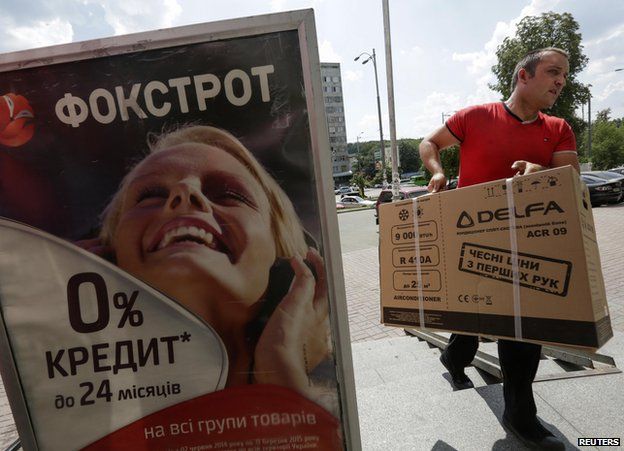Ukraine crisis: Parliaments to ratify landmark EU pact
- Published

Ukrainian MPs and the European Parliament are set to ratify a key EU association pact criticised by Russia.
Both sides will start the procedure at 10:00 GMT, in what Ukraine's president said would be a "historic" day.
But negotiations with Russia last week led to the important free trade part of the pact being postponed until 2016.
There has been heavy shelling around the government-held airport of Donetsk in eastern Ukraine, despite a fragile ceasefire signed on 5 September.
Pro-Russian rebels have been engaged in heavy fighting with government forces in the Donetsk and Luhansk regions since April - a month after Russia annexed Ukraine's Crimea peninsula.
At least 3,000 people have been killed in the conflict and more than 310,000 internally displaced in Ukraine, the UN says.
Russia denies sending troops and heavy weapons to help the rebels, as alleged by Ukraine and the West.
The wide-ranging EU-Ukraine association agreement (officially called the AA/DCFTA) would make Ukraine compliant with EU standards in the areas of human rights, security and arms control, and would remove trade barriers.
The pact has been signed, but Russia opposes the free trade provisions, saying its market could be flooded with cheap EU goods shipped via Ukraine.
So until 2016 Ukraine will maintain its existing restrictions on imports from the EU, while enjoying full access to the EU market for its own exports.
In return, Russia has pledged to maintain favourable trade rules in place for Ukraine as an ex-Soviet republic.
Yet the crisis has severely hit Russia-Ukraine trade ties, with the two neighbours imposing economic sanctions on each other.
Tit-for-tat trade bans
The BBC's Olexiy Solohubenko, a Ukraine specialist, says it is a complete misnomer to talk of any free trade between them under current conditions.
Russia derives most benefit from industrial imports from parts of eastern Ukraine now controlled by the rebels, he points out.
Russia has banned imports of Ukrainian dairy produce, potatoes, fruit juice and alcoholic drinks, as well as tinned fish. It alleges inadequate food hygiene standards, but the embargo coincides with a diplomatic breakdown between Moscow and Kiev.
Meanwhile, Ukraine has banned exports of defence-related goods to Russia and is blacklisting some 200 Russians whom it accuses of helping to destabilise Ukraine.
A further aggravation is Russia's row with Ukraine over gas supplies. Russia's state-owned gas giant Gazprom halted gas deliveries in June, demanding that Ukraine repay its debts.
In other developments on Tuesday:
- Ukrainian MPs adopted legislation aimed at ending the conflict in the east, including a special status for rebel-held parts of eastern Ukraine
- They also approved an amnesty for rebels, except those described as having committed grave crimes, including the shooting down of Malaysia Airlines Flight MH17
- About 1,300 soldiers from 15 countries - including the US and other Nato members - are continuing military exercises in Lviv in western Ukraine.
Analysis: Laurence Peter, BBC News
The far-reaching EU-Ukraine trade and association agreement at the root of the whole Ukraine crisis is back... but not quite.
The European Parliament and Ukrainian Rada are going ahead with ratification on Tuesday, but the key provisions on free trade will not be implemented until December next year at the earliest.
That delay was the main result of EU-Russia-Ukraine talks in Brussels on Friday, and it is being seen as a significant concession to Russia.
A joint statement after the latest round of trade talks said the parties involved would use the delay to "consult on how to address concerns raised by Russia".
On the eve of the vote in the parliaments in Kiev and Strasbourg, Ukrainian President Petro Poroshenko said the ratification of the association agreement would be a "historic day".
Mr Poroshenko - who initialled the deal back in June - said that "de facto this is a reform programme in our country" aimed at guaranteeing "the rule of law, freedom of speech and decisive anti-corruption steps".
In November, hundreds of thousands of Ukrainians took to the streets to protest against then President Viktor Yanukovych's abrupt decision to cancel the agreement's original planned signing.
However, Mr Poroshenko is facing growing criticism in Ukraine for apparently caving in to pressure from Moscow and postponing implementation of the free trade deal with the EU.